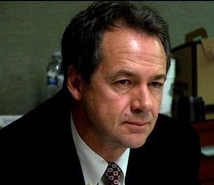
Montana Democrats have fallen into line behind this terrible strategy.
Montana Republicans aren’t buying into it, however.
Let’s discuss.
Today on the Flathead Beacon there was an article called Governor: Budget Cuts Will ‘Hurt’ Montana Residents.
The subtitle is “without a fix, budget shortfall will lead to cuts to essential services and send shockwaves throughout the state.”
What Bullock is doing here is ratcheting up the fear-levels so that he – however improbable it may seem – can get his way.
“Montana residents can expect devastating losses to essential services,” we’re told, which is our first lie.
My family won’t be affected at all. My neighbors won’t be affected. In fact, most of the people in my area of town won’t be affected.
A more accurate sentence would have been some Montana residents will be affected, but not most. In fact, it’ll be a very small minority of Montana’s population that’s affected.
Bullock’s only goal is to “generate some additional revenue” to tackle this problem. He in no way wants to cut spending.
That’s a shame…as there are tons of ways to save a few bucks here and there. Just look at Montana’s non-essential spending!
Two years ago I put up an article called What is Montana Spending Its Money On?
One of the interesting things is that Montana is spending (or was in 2013), over $1.9 billion on “other funds.”
Some areas of “other funds” that can be cut include:
- Economic Development
- Environmental Projects
- Parks and Recreation
- Housing
- Aid to Local Governments
I feel those areas can and should be cut for a very simple reason – people’s lives aren’t on the line.
- If we spent a little less on marketing the state to potential tourists, we’d have enough money to keep old people in their state-run nursing homes.
- If we spent a little less on fixing up our parks, we’d have enough money to ensure sick or abused kids can get the help they need.
- If we spent a little less on our environmental projects, we’d have enough money to help people struggling with drugs and mental illness.
But we choose not to do this.
Bullock chooses not to do this.
What Bullock wants to do is tax cigarettes more, tax wine more, tax medical marijuana more, tax hotel beds more, and tax rich people more who are making over $500,000 a year.
Bullock claims that these new taxes will “bring in millions of dollars in new revenue.”
Sadly for Bullock, majority Republicans in the legislature “have flatly rejected” Bullock’s proposals.
So that leaves us at a stalemate, and one Bullock won’t be able to overcome politically. For one thing, the man simply doesn’t have the negotiating skills or the business acumen to make deals.
That means he’ll order state agencies to cut nearly $230 million from their budgets, as he’ll have no other choice – the GOP legislature simply won’t play ball.
And why should they?
Just like my family and my neighbors, none of them will be affected by these spending cuts. A big reason for that is those Republicans spent much of their lives getting up each morning, going to work, following the rules of society, and as a result, they’re able to take care of themselves and their family.
A very small minority of Montanans chose not to do those things, and now the state has to take care of them with the money you pay in taxes.
Then there are the state workers that are set to lose their jobs.
Again, this doesn’t matter to you.
If you’re like me, you probably work in the private sector…you know, an area of the economy where they actually expect results.
We don’t get retirement or healthcare or holidays off.
We work in the real world, and many of those Helena bureaucrats are about to join us.
Remember, between 2004 and 2011, Montana added 1,000 full-time employees. And my do those state workers do well for themselves – average salaries jumped from $35,000 to $44,000 over the same period of time.
But that’s not quite accurate. Throw in healthcare and you’ll see that the average compensation for state workers went from $47,000 to $61,000 a year.
Now…let’s compare Montana state employee counts by agency over a few years.
When Governor Marc Racicot left office in 2001, state agencies were funded at the following levels:
- Administration: $3.75 million
- Agriculture: $8 million
- Commerce: $48 million
- Corrections: $93.7 million
- Environmental Quality: $37.8 million
- Fish, Wildlife and Parks: $43.6 million
- Labor: $51 million
- Natural Resource and Conservation: $30.8 million
- Public Health and Human Services: $766.8 million
- Revenue: $30 million
- Transportation: $460 million
The number of employees each department had at the end of Racicot’s time in office was like so:
- Administration: 416
- Agriculture: 110
- Commerce: 388
- Corrections: 1,025
- Environmental Quality: 349
- Fish, Wildlife and Parks: 570
- Labor: 635
- Natural Resource and Conservation: 500
- Public Health and Human Services: 2,697
- Revenue: 650
- Transportation: 2,000
That comes out to 9,340 workers for those 11 agencies.
Now let’s fast-forward 10 years to 2010.
- Administration: 155
- Agriculture: 120
- Commerce: 52
- Corrections: 1,306
- Environmental Quality: 387
- Fish, Wildlife and Parks: 696
- Labor: 755
- Natural Resource and Conservation: 557
- Public Health and Human Services: 2,942
- Revenue: 666
- Transportation: 2,113
That comes out to 9,749 workers…and increase of 409 workers.
And of course, state employee counts have only gone up in the 7 years since then. For instance, Corrections has a $209 million budget for 2018 and they had 1,400 employees in 2017.
If we stick with our earlier numbers, however, we see that from 2000 to 2010, Montana increased its employee count for those 11 agencies by 409 workers.
Sure, some agencies saw substantial drops – Admin went from 416 workers down to 155 while Commerce went from 388 to 52.
Still, we added 409 workers and on the low-end that costs the state $19.2 million a year, and on the high-end $24.9 million.
Let’s not even get into the payroll taxes that each of those employee requires, either. That’d probably double those amounts.
So by cutting the 409 workers we added over 10 years, the state could save upwards of $50 million.
Would you rather tell a state bureaucrat that they have to find a new job, or would you rather tell a frail and immobile senior citizen that they have to find a new place to live?
Montana is a boom-and-bust state. Hard choices are required for those that decided to live out those cycles.
Conclusion
Republicans in the legislature are content to sit on their hands and do nothing. They know Bullock is a lame duck with more national ambitions than concern for his state. They know they’ll win reelection easily.
Meanwhile tons of innocent and abused and low-income folks are in the crossfire.
The state could take a hard look at its finances, but it chooses not to. Sure, on October 4 we’ll have some agency numbers and a clearer idea of where cuts will happen.
But the state continues to waste money in many, many areas…and that money adds up.
Take Print Services. They spend about $30,000 to $40,000 a year to print up a state agency phonebook. Schweitzer had cut this out of their budget, but now it’s been added back.
State workers are just too damn lazy to look up a phone number on the computer – they need to waste paper and money so they can have an ‘easier’ time at work.
And because of their choices, old people will have to live on the street and abused kids will have to keep living at home.
That’s how important that state phone book is. There are dozens if not hundreds of examples in the state budget that are just like that.
But why roll up the sleeves and take the fine-toothed comb and find those problem areas and cut them?
Because then you can’t point fingers.
We’ll see a lot of finger-pointing over the coming weeks, and more if we decide to waste tens of thousands of dollars on a special session that’ll accomplish nothing.
Meanwhile, I don’t think much in your life will change.
Boom-and-bust in Montana. If you were here in the 1980s, you saw it a lot worse than this. And you also know that we’ll pull through it.
Until then, be smart. Pinch your pennies, eat leftovers, and stay home more. Now’s the time to save money, not spend it.
Be smart – you live in Montana.
Additional Notes
Edwards, Paul. “What about Racicot’s legacy?” Great Falls Tribune. May 2000.

